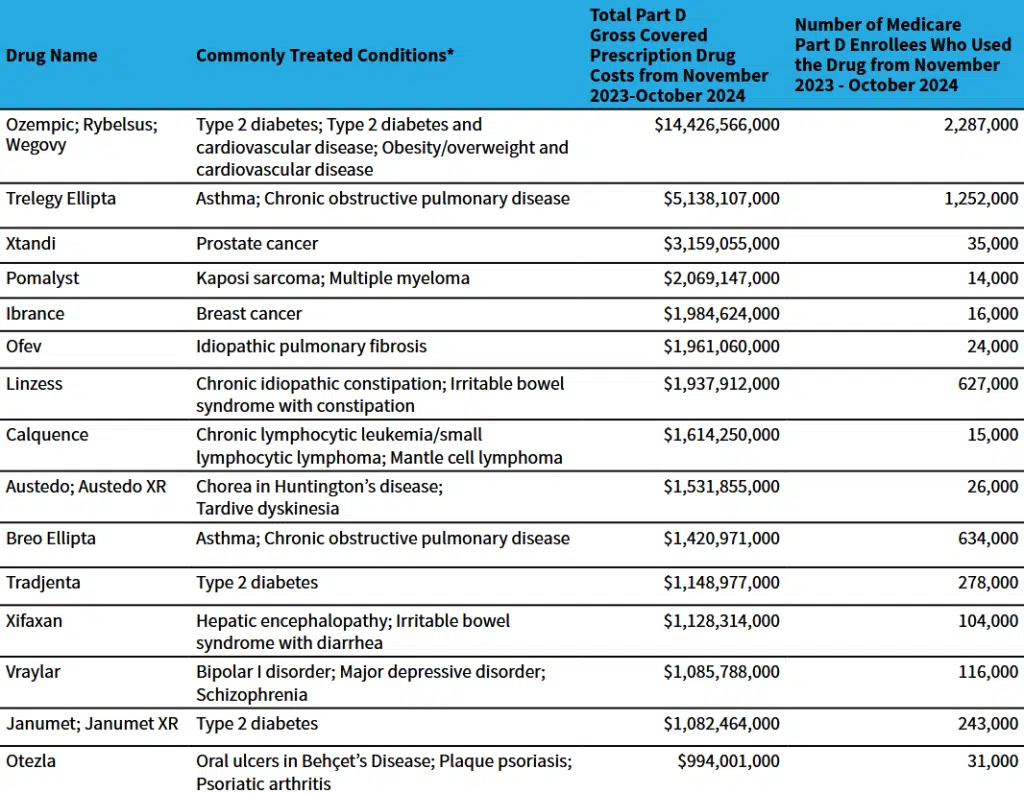Second Set of Part D Drugs for Medicare Negotiation Includes Blockbuster Diabetes and Weight-Loss Drugs

On January 17, the U.S. Department of Health and Human Services (HHS) announced the 15 Part D drugs that will be subject to the second round of price negotiations under the Inflation Reduction Act (IRA). The negotiations are set to occur in 2025, with final prices taking effect in 2027.
Drugs Selected for Negotiation
The medications were chosen based on prescriptive criteria outlined in the IRA. The law requires HHS to prioritize drugs with the highest Medicare spending and no competition, among other factors. The resulting list includes the following medications on which millions of Medicare beneficiaries rely to treat conditions such as cancer, asthma, and diabetes.

Source: Centers for Medicare & Medicaid Services. (n.d.). Medicare negotiation: Selected drug list for initial price applicability year 2027. Retrieved January 23, 2025, from https://www.cms.gov/files/document/factsheet-medicare-negotiation-selected-drug-list-ipay-2027.pdf
Estimated Savings
HHS estimates over the last year, nearly 5.3 million Part D enrollees used these medications, accounting for $41 billion, or 14% of Part D spending. While the exact savings realized by the second cycle of the IRA’s negotiation program will depend on the final prices, lower costs are expected system-wide.
The Congressional Budget Office (CBO) previously anticipated the IRA’s negotiation program will save Medicare $98.5 billion over the coming decade…
The Congressional Budget Office (CBO) previously anticipated the IRA’s negotiation program will save Medicare $98.5 billion over the coming decade as well as reduce expenses for beneficiaries and taxpayers. By lowering drug prices and increasing affordability, the CBO projected the changes will help people with Medicare adhere to their treatment plans, improving health outcomes and reducing the need for more costly interventions.
IRA Drug Price Negotiations So Far
The first round of negotiations suggests the program is on track. Those talks concluded in August and reduced list prices for all 10 selected drugs by 38% to 79%. In 2026, the first year those prices take effect, people with Medicare are projected to save $1.5 billion in out-of-pocket costs, and Medicare will save at least $6 billion. These savings will grow over time. Under the IRA, HHS will select additional medications for negotiation in future years, allowing more people to afford care and the number of drugs to accumulate.
Medicare Rights Supports IRA Drug Negotiation Program
Medicare Rights strongly supports the IRA’s negotiation program. It is a critical step towards curbing high drug prices in ways that improve program sustainability, beneficiary health and financial security, and taxpayer costs. If implemented as Congress intended, the positive effects of these negotiations will multiply as more drugs have prices that better reflect their value.
If implemented as Congress intended, the positive effects of these negotiations will multiply as more drugs have prices that better reflect their value.
Further Reading
Read the HHS press release, HHS Announces 15 Additional Drugs Selected for Medicare Drug Price Negotiations in Continued Effort to Lower Prescription Drug Costs for Seniors
Read the fact sheet, Medicare Drug Price Negotiation Program: Selected Drugs for Initial Price Applicability Year 2027.
The Latest
Most Read
Add Medicare to Your Inbox
Sign up to receive Medicare news, policy developments, and other useful updates from the Medicare Rights.
View this profile on InstagramMedicare Rights Center (@medicarerights) • Instagram photos and videos









